The Venice Commission confirmed the risks of removing judges, which the BCU had warned about
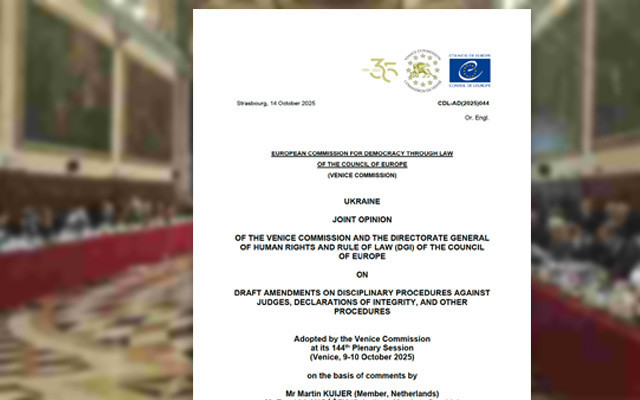
The European Commission for Democracy through Law (Venice Commission) and the Directorate General of Human Rights and Rule of Law (DGI) of the Council of Europe warned Ukraine about the risk of abuse associated with the possibility of temporarily suspending a judge during disciplinary proceedings.
The European institutions examined draft laws No. 13137, No. 13137-1, and No. 13165-2 on amendments to the Law «On the judicial system and status of judges» and other legislative acts concerning the improvement of disciplinary procedures and declarations of integrity of judges and family ties of judges, and adopted a joint conclusion No. CDL-AD(2025)044 as a result of their analysis.
According to the proposed amendments, a judge may be temporarily suspended during disciplinary proceedings for up to two months, with the possibility of extension for another two months.
Earlier, the President of the Ukrainian National Bar Association, the Bar Council of Ukraine Lidiya Izovitova warned the Venice Commission and the DGI about the dangerous consequences of such changes during consultations.
In particular, she voiced the position of BCU that, according to the drafts, the mechanisms of criminal proceedings are unjustifiably transferred to disciplinary proceedings, where there are no risks to society a priori. It also creates a basis for manipulation, where disciplinary complaints can be used to remove «inconvenient» judges, creating an atmosphere of fear among judges. On these grounds, the bar self-government body concluded that the changes are conceptually unjustified and systemically dangerous for independent justice. Therefore, the application of repressive measures to a judge even before the fact of a violation has been established is contrary to the presumption of innocence and the principle of proportionality. Such changes transform the legal system from an instrument of justice into a mechanism of control.
In their conclusion, the Venice Commission and the DGI drew attention to the shortcomings of the drafts, in particular the duplication of regulations, and recommended harmonizing the rules on temporary suspension in various laws, as well as within the Law «On the High Council of Justice».
European institutions also warned of the risk of abuse during the temporary suspension of a judge. «Such a measure could be used improperly, even to change the composition of the court that is to hear the case, - the conclusion states. - Therefore, given the risk of misuse, the Venice Commission and the DGI do not recommend introducing this procedure in the form in which it is proposed in the draft amendments».
Popular news
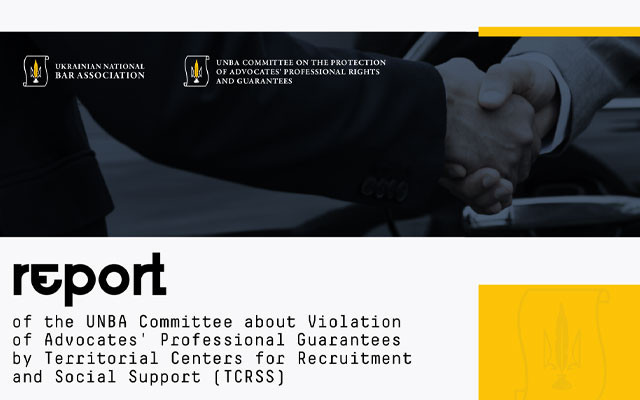
Guarantees of the practice of law
The UNBA presented a report on violations of advocates' rights in the TCC
The Committee for the protection of advocate's rights and guarantees of legal practice of the UNBA has prepared a consolidated report on violations of advocate's professional rights and guarantees of legal practice by territorial recruitment and social support centers for the period from 2022 to the first half of 2025.
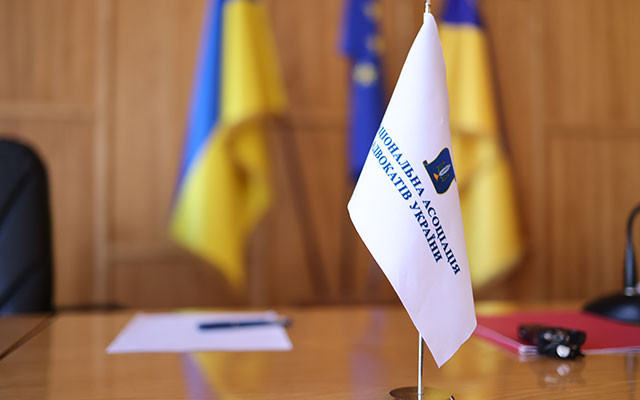
Self-government
Statement by the UNBA Committee regarding manipulative journalistic material
Statement by the UNBA Committee on information policy and interaction with the media regarding manipulative journalistic material aimed at discrediting the advocacy institution.
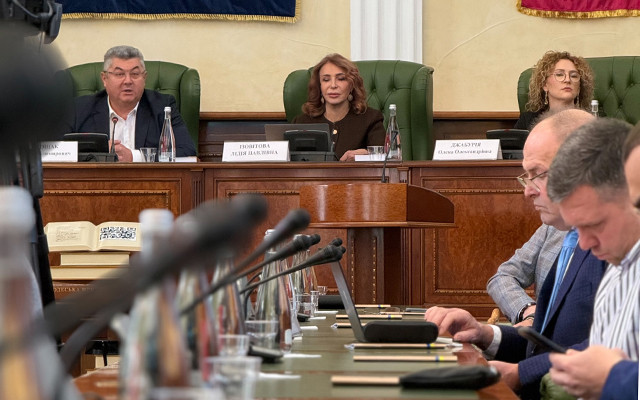
Guarantees of the practice of law
L. Izovitova: today advocacy maintains its independence and fights for guarantees for the profession
The Ukrainian advocacy remains an independent, constitutionally recognized institution of justice, which, in the conditions of war, has not only retained its subjectivity, but also consistently fights for guarantees to protect the profession.

Access to the profession
For candidates for the advocate: BCU has reminded them of the rules for crediting teaching experience
For the purposes of admission to the qualification exam, a candidate's work in scientific and teaching positions may be counted as experience in the field of law only if the position requires legal education.

Discussion
Urban Planning Code: what should the new rules for rebuilding Ukraine be?
Does Ukraine need separate codification in the field of urban planning, which model of law to choose, and how to ensure a balance between the interests of the state, communities, businesses, and citizens in the context of post-war reconstruction?
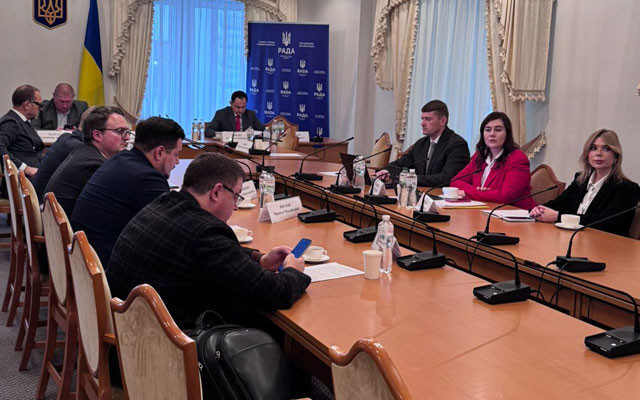
Guarantees of the practice of law
The Verkhovna Rada took another step towards ratifying the Convention on the protection of the profession of advocate
On November 5, the Verkhovna Rada held a working meeting dedicated to the translation of the Council of Europe Convention on the protection of the profession of advocate for its subsequent signing and ratification. The issue was initiated by the Ministry of Foreign Affairs, which drew attention to the key term «lawyer» in the international treaty.

Interaction
NACB is looking for corruption risks in its activities. Advocates are asked to help
The National Anti-Corruption Bureau of Ukraine has launched a survey aimed at gathering information to identify corruption risks in the activities of the National Bureau and prepare an Anti-Corruption Program for 2026–2028.
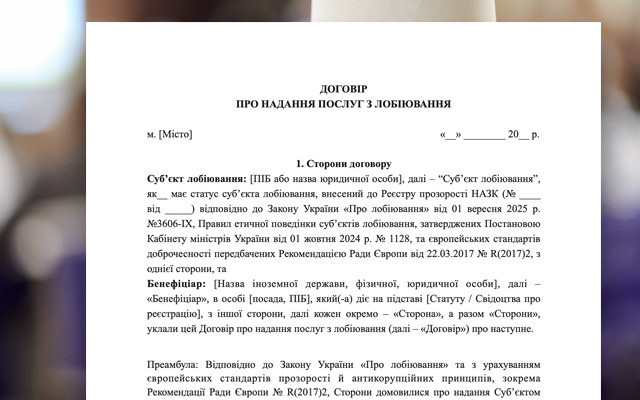
Interaction
Agreement on the provision of lobbying services: a template for advocates has been developed by the UNBA
The Ukrainian National Bar Association has prepared a model agreement for the provision of lobbying services that complies with the requirements of the relevant law and takes into account the specific features of such activities carried out by persons providing legal assistance.
Publications

Censor.net Protecting advocates – protecting justice: addressing concerns about the new law

Ihor Kolesnykov A BRIEF SUMMARY REGARDING THE APPLICATION OF THE ORDER ON EXTENDED CONFISCATION IN LATVIA REGARDING FINANCIAL ASSETS OF…

Valentyn Gvozdiy WORKING IN A WAR ZONE

Lydia Izovitova Formula of perfection

Sergiy Vylkov Our judicial system is so built that courts do not trust advocates

Iryna Vasylyk Advocacy in the proclamation of Independence of Ukraine

Oleksandr DULSKY When we cross the border of the Supreme Anti-Corruption Court, we get into another department of the National Anti-Corruption…

Vadym Krasnyk The UNBA will work, and all obstacles and restrictions are only temporary inconveniences
